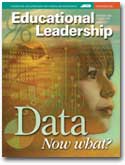What have Educational Leadership readers been talking about? Read these comments from Inservice, the ASCD blog (www.ascd.org/blog), and then visit the blog to share your thoughts.
In Response to "Years of Experience vs. Quality of Teaching"
To make pay for performance a fair proposition, we must consider many extenuating circumstances. If pay is based on students' test scores, will only teachers in the testing grades be eligible? What about the primary teachers who have laid the foundation? Or what about the 3rd grade teacher whose students enter 3rd grade reading at a 1st grade level? Even if those students progress, they may not progress enough to pass the test. Some have proposed that teachers working at "high risk" schools be eligible for merit pay. But is that fair to those teachers who work just as hard at other schools? I don't think we should have merit pay until fair and equitable criteria are established. —Delisa
A reality is that a lot of good new teachers, like myself, are getting burnt out in the first few years. Getting financial recognition for their hard work and dedication might be the factor that keeps some of these good teachers within the public education system.—henne831
In response to "The Math They Lack"
I'm in Georgia, and I really like some aspects of our newly adopted high school math curriculum. It has formative learning tasks, followed by and infused with direct instruction of skills as needed. The tasks are authentic, leading to a more vibrant and flexible math conversation in my classroom. That being said, the number of standards covered in Math 1, freshman year, even with an additional math support elective, make it impossible for me to use as many of the tasks as I want to. My class is small-group special education, and my nine students, in even smaller task groups, take a long time to think about authentic tasks. —Adrienne
Students' curriculum choices in mathematics at the high school level are driven by universities. Many colleges will only recognize algebra, geometry, and calculus as math credits for admittance. Many states and school districts have dropped the courses that help our students determine career choices and be productive, economically sound citizens.
Often when students get to college, they must learn how to be independently financially responsible while inundated with credit applications. Then we wonder why they leave college owing more money then they will probably earn in their first years of work. —Darlene
